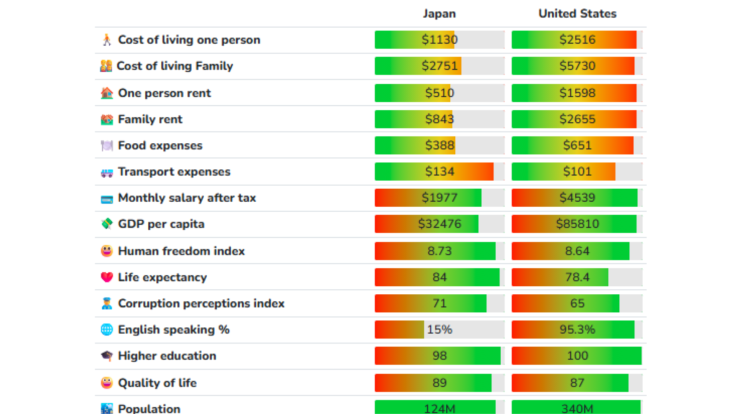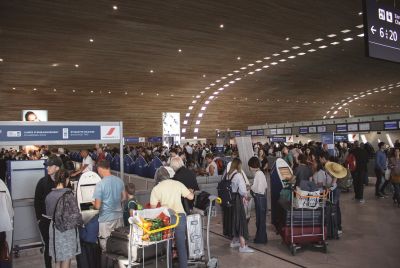'If You're a "Broke American" Who Wants to Visit Japan, Do This': US Man Shares Clever and Smart Money Tips
The video, viewed millions of times, breaks down affordable flights, accommodation hacks, and budget-friendly food options for travellers planning a Japan trip in 2025.

A US traveller has gone viral after sharing a step-by-step guide showing how 'broke Americans' can move to Japan on a budget.
His YouTube Shorts video, posted on 2 October 2025, breaks down how to save money, secure a student visa, and live affordably while studying and exploring Japan.
The clip, which has gained millions of views, has resonated with younger audiences struggling with high US living costs, student debt, and inflation. It offers a detailed, SEO-rich blueprint for surviving—and thriving—in Japan without significant savings.
Step-by-Step Budget Plan to Live in Japan
The traveller suggests starting by working a regular job in the United States for three to six months to save a modest fund before enrolling in a budget-friendly Japanese language school. Many such schools, he explains, help international students secure student visas valid for up to 2 years.
According to the video, there are three tiers of schools:
- Visa-support-only schools with minimal instruction,
- Standard programmes balancing cost and quality, and
- Premium institutions catering to Chinese and Korean students.
He urges choosing reputable schools that offer real instruction and community support, not just visa paperwork.
For travel, he recommends flying first to Los Angeles via low-cost US carriers like Spirit Airlines or Frontier, then booking a ZIPAIR flight to Tokyo. ZIPAIR, a Japan Airlines subsidiary, regularly lists one-way fares from Los Angeles to Tokyo between US $330–$380, excluding baggage.
Living Cheap Once You Arrive
Once in Japan, the traveller outlines a frugal lifestyle plan. Basic meals at Matsuya, a popular Japanese fast-food chain, cost as little as ¥400–¥600 (roughly US $2.50–$4). He recommends joining Meetup groups to make friends and buying drinks at convenience stores, where cans of soju or chu-hai often cost just ¥150 (about US $1).
He also notes that Japan's national health insurance is affordable for students, providing reliable medical coverage during their stay.
'If you're smart about where you eat, where you live, and how you travel,' he says, 'you can live comfortably in Japan without needing a six-figure income.'
Japan vs the United States: The Cost Gap

The traveller's advice aligns with official cost-of-living data showing Japan is considerably cheaper than the US.
According to LivingCost.org (2025), the average monthly expenses for one person in Japan are about US $1,130, compared with US $2,516 in the US roughly 55 percent lower overall.
Rent in Japan, meanwhile, averages about two-thirds less than in America, per Exiap data.
For Americans earning in US dollars or saving before arrival, the difference can make a major impact: Japan offers high safety, reliable infrastructure and lower everyday expenses, all crucial for long-term affordability.
This cost gap means that Americans earning or saving in dollars can stretch their money further in Japan. With its low crime rate, excellent public transport, and clean cities, Japan offers substantial value for money compared with the US.
@andyworld1 Americans Are living in their car due to the cost of living. America has become so expensive that people have to look for alternate ways of living to save money. Worst part is that some politicians are making car living illegal. #livingincar costofliving #leaveamerica
♬ original sound - Andy's world - Andy's world
Beyond Money: Mindset and Cultural Immersion
The traveller emphasises attitude as the key to success. 'Keep working your boring job for three to six months, save up as much as you can,' he advises. Once in Japan, he urges newcomers to embrace language learning and local culture, warning against 'visa-only' schools that provide little academic or social value.
His message is pragmatic: Japan isn't a luxury escape but a viable, structured path for those willing to work hard, study, and adapt.
By combining an authentic student visa, budget flights, and minimalist living, he believes Americans can turn an ambitious dream into an affordable new life abroad.
For many Americans searching for new horizons, this 'broke-but-smart' approach could turn an ambitious dream into an affordable reality.
Japan on $1,000 a Month-A Sample Budget Breakdown
Here's a realistic monthly budget showing how an American student or traveller could comfortably live in Japan on roughly US$1,000 (£820) a month while studying or exploring. Data reflects averages from LivingCost.org, Exiap, and the Ministry of Internal Affairs of Japan.
| Category | Estimated Monthly Cost (USD) | Notes / Tips |
|---|---|---|
| Rent (shared flat or dorm) | $350–$450 | Choose a small room in Tokyo's outskirts or cities like Osaka, Fukuoka, or Sapporo. |
| Food & groceries | $200–$250 | Eat at low-cost chains (e.g., Matsuya, Sukiya). Cook simple meals from discount supermarkets. |
| Transportation | $60–$80 | Buy a commuter IC card for trains and buses; use bicycles for short trips. |
| Utilities & mobile | $70–$100 | Split Wi-Fi and electricity bills with roommates; use prepaid SIM cards. |
| Health insurance | $20–$25 | The national student plan is mandatory but affordable. |
| Leisure & social life | $50–$80 | Attend free or low-cost Meetup events; buy drinks at convenience stores. |
| Miscellaneous / savings | $50–$75 | Set aside for travel, emergencies, or visa renewals. |
Total: ≈ $950–$1,060 per month
Money-Saving Insights
- ZIPAIR, AirAsia, and Scoot often offer sub-$400 flights from Los Angeles or Honolulu to Tokyo.
- Prepaid food chains and 100-yen stores help reduce costs dramatically.
- Language schools sometimes offer part-time job assistance, allowing students to legally work up to 28 hours per week under Japan's immigration rules.
- Paying rent quarterly can sometimes earn small discounts.
Editorial Note:
Figures are approximate averages based on 2025 exchange rates and verified cost-of-living sources. Actual expenses depend on lifestyle, location, and school arrangements. Always confirm current visa work permissions with the Immigration Services Agency of Japan before employment.
© Copyright IBTimes 2025. All rights reserved.





















